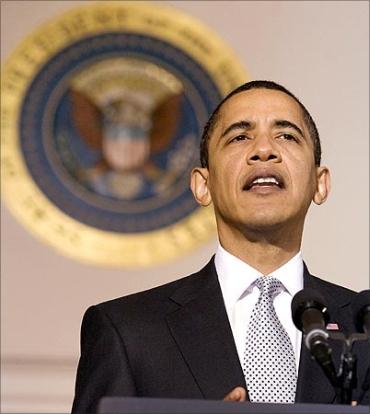
United States President Barack Obama on Thursday evaded a question about whether he would be willing to cut off all assistance to Pakistan in the wake of allegations by recently retired chairman of the Joint Chiefs of Staff Admiral Mike Mullen that the Haqqani network is a veritable arm of Pakistan's Inter Services Intelligence.
The US administration had held the Haqqani network responsible for the recent attack on the American embassy in Kabul and other attacks against its troops
In a press conference at the White House on Thursday, essentially to discuss his jobs plan, Obama sought redoubling of efforts to reach a rapprochement between India and Pakistan as a means to alleviate Pakistan's paranoia that India is its existential threat.
Reportage: Aziz Haniffa in Washington, DC
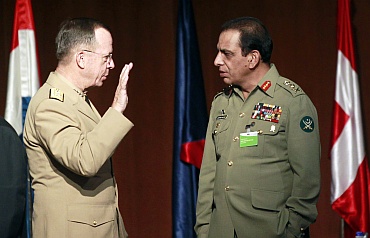
Asked if he agreed with Admiral Mullen's accusation that Pakistan's intelligence agency has used the Haqqani network as a virtual arm, Obama said, "With respect to Pakistan, I have said that my number-one goal is to make sure that the Al Qaeda cannot attack the US homeland and cannot affect US interests around the world."
"And we have done an outstanding job in going after Al Qaeda in this border region between Pakistan and Afghanistan," he said.
Giving Islamabad a pat on the back, he declared, "We could not have been as successful as we have been without the cooperation of the Pakistan government. And so, on a whole range of issues they have been an effective partner with us."
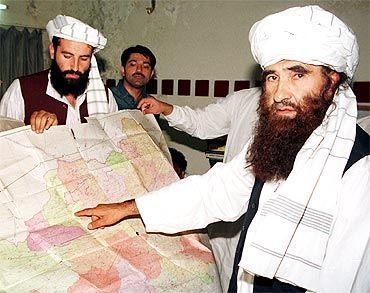
Obama said, "What is also true is that our goal of being able to transition out of Afghanistan and leave a stable government behind -- one that is independent, one that is respectful of human rights, one that is democratic -- that Pakistan, I think, has been more ambivalent about some of our goals there."
Agreeing with Mullen's contention, Obama said, "I think that they have hedged their bets in terms of what Afghanistan would look like. And part of hedging their bets is having interactions with some of the unsavoury characters who they think might end up regaining power in Afghanistan after coalition forces have left."
He said, "What we have tried to persuade Pakistan of is that it is in their interest to have a stable Afghanistan; that they should not be feeling threatened by a stable, independent Afghanistan."
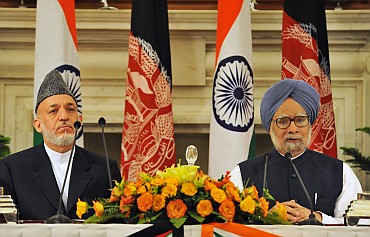
"We have tried to get conversations between Afghans and Pakistanis going more effectively than they have been in the past, but we have still got more work to do," he said, and acknowledged, "There is no doubt that there are some connections that the Pakistani military and intelligence services have with certain individuals that we find troubling. And I have said that publicly, and I have said it privately to Pakistani officials as well."
Obama then rationalised Pakistan's security threat perceptions, arguing, "They see their security interests threatened by an independent Afghanistan in part because they think it will ally itself to India, and Pakistan still considers India its mortal enemy."
Thus, he said, "Part of what we want to do is actually get Pakistan to realise that a peaceful approach towards India would be in everybody's interests, and would help Pakistan actually develop, because one of the biggest problems we have in Pakistan right now is poverty, illiteracy, a lack of development, civil institutions that aren't strong enough to deliver for the Pakistani people."
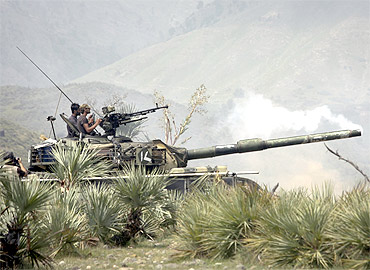
"And in that environment you have seen extremism grow. You have seen militancy grow that doesn't just threaten our efforts in Afghanistan but also threatens the Pakistani government and the Pakistani people as well. So trying to get that reorientation is something that we are continuing to work on; it's not easy," he said.
But when pressed on what the consequences would be for Pakistan's double-game of patronising proxies like the Haqqani network and the Afghan Taliban that attack American troops as Mullen had told the Senate Armed Services Committee, Obama was circumspect.
"We will constantly evaluate our relationship with Pakistan," he said, adding, "We have a great desire to help the Pakistani people strengthen their own society and their own government."
Obama argued that in such a situation, "I wouldd be hesitant to punish aid for flood victims in Pakistan because of poor decisions by their intelligence services. But there is no doubt that we are not going to feel comfortable with a long-term strategic relationship with Pakistan if we don't think that they're mindful of our interest as well."